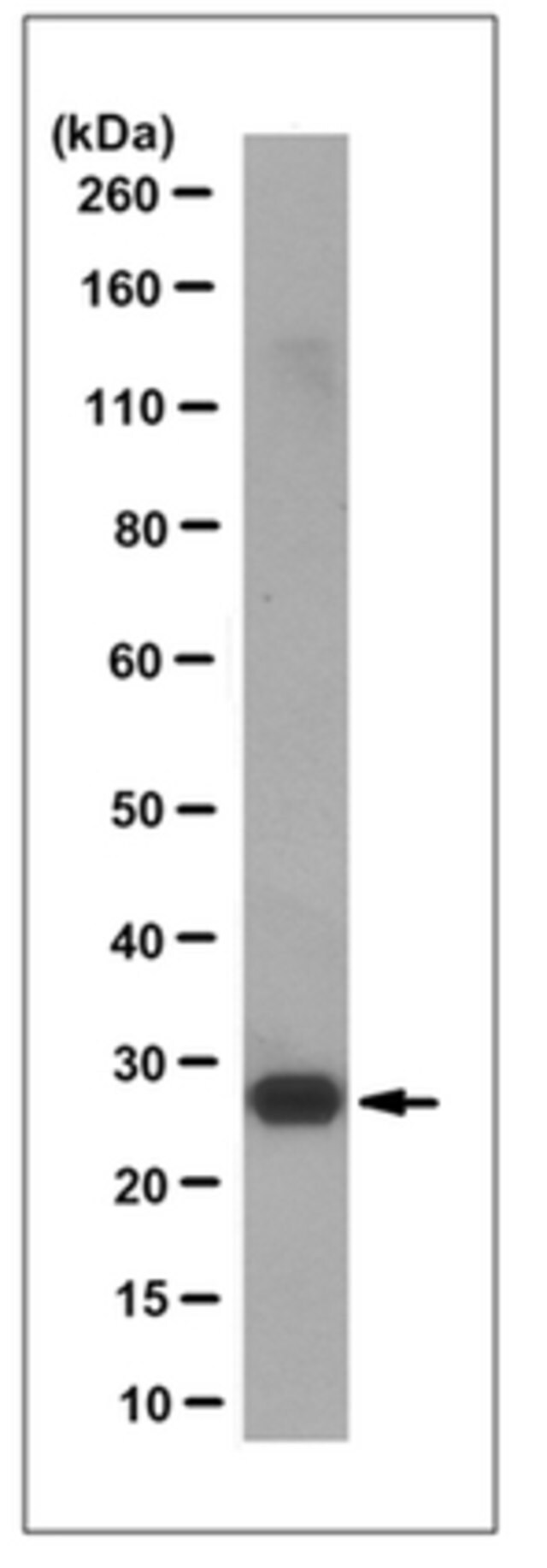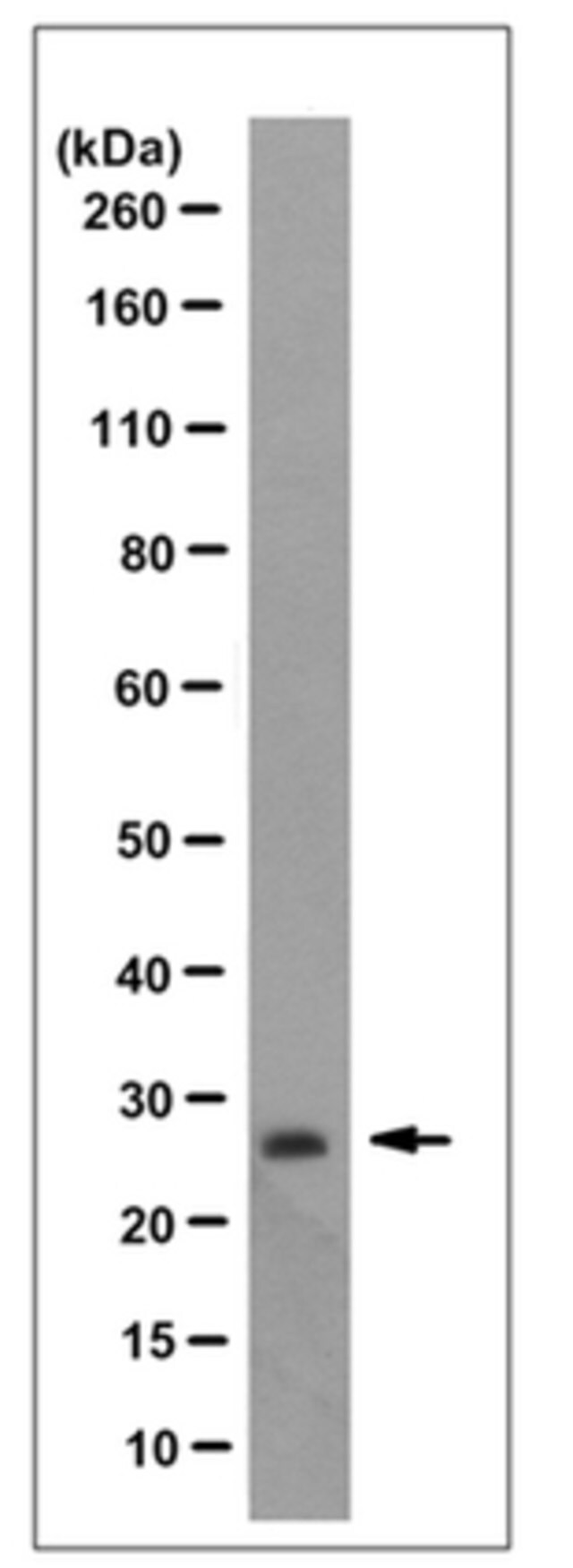您的位置:首页 > 产品中心 > Anti-NQO2 Antibody, clone 4A4.1
Anti-NQO2 Antibody, clone 4A4.1

产品别名
Anti-NQO2 Antibody, clone 4A4.1
Ribosyldihydronicotinamide dehydrogenase [quinone], NRH dehydrogenase [quinone] 2, NRH:quinone oxidoreductase 2, Quinone reductase 2, QR2
基本信息
| eCl@ss | 32160702 |
| NACRES | NA.41 |
| General description【一般描述】 | Ribosyldihydronicotinamide dehydrogenase [quinone] (EC 1.10.5.1; UniProt P16083; also known as NRH dehydrogenase [quinone] 2, NRH:quinone oxidoreductase 2, Quinone reductase 2, QR2) is encoded by the NQO2 (also known as NMOR2) gene (Gene ID 4835) in human. NQO1 (EC 1.6.5.2) and NQO2 (EC 1.10.5.1; formerly EC 1.10.99.2) constitute the quinone oxidoreductase family in human. NQO1 is involved in vitamin K metabolism and in reducing the cellular quinone concentration to prevent the build-up of cellular reactive oxygen species (ROS). Both enzymes contain a tightly bound FAD as the oxidant cofactor, but differ in their reductant cofactors utilization. While NQO1 can efficiently utilize NADH or NADPH, NQO2 exhibits only low activity in the presence of NADH or NADPH. Instead, non-physiological compounds, such as dihydronicotinamide riboside (NRH), N-methyldihydronicotinamide, and dihydrobenzylnicotamide, are reported to act as good reductant cofactors in NQD2-catalyzed reactions in vitro. NQO1 & NQO2 catalyzed the reduction of a wide variety of substrates, including quinones, nitro-compounds, and iron (III) ions. NQO1 is inhibited by the anticoagulant dicoumarol, while NQO2 is only weakly inhibited by dicoumarol and more strongly inhibited by resveratrol. |
| Specificity【特异性】 | Clone 4A4.1 recognizes an internal epitope within the N-terminal half of human Quinone reductase 2. |
| Immunogen【免疫原】 | Epitope: Internal (N-terminal half). GST-tagged recombinant human NQO2 N-terminal fragment. |
| Application【应用】 | Research Sub Category Oxidative Stress Anti-NQO2 Antibody, clone 4A4.1 is an antibody against NQO2 for use in Western Blotting, Immunohistochemistry. Research Category Apoptosis & Cancer Western Blotting Analysis: 0.5 µg/mL from a representative lot detected NQO2 in 10 µg of Jurkat cell lysate. Immunohistochemistry Analysis: A 1:1,000 dilution from a representative lot detected NQO2 in human kidney, liver, and cerebral cortex tissue sections. |
| Quality【质量】 | Evaluated by Western Blotting in HeLa cell lysate. Western Blotting Analysis: 0.5 µg/mL of this antibody detected NQO2 in 10 µg of HeLa cell lysate. |
| Physical form【外形】 | Purified mouse monoclonal IgG2bκ antibody in buffer containing 0.1 M Tris-Glycine (pH 7.4), 150 mM NaCl with 0.05% sodium azide. Format: Purified Protein G Purified |
| Other Notes【其他说明】 | Concentration: Please refer to lot specific datasheet. |
产品性质
| Quality Level【质量水平】 | 100 |
| biological source【生物来源】 | mouse |
| antibody form【抗体形式】 | purified immunoglobulin |
| antibody product type | primary antibodies |
| clone【克隆】 | 4A4.1, monoclonal |
| species reactivity | human |
| technique(s) | immunohistochemistry: suitable western blot: suitable |
| isotype【同位素/亚型】 | IgG2bκ |
| NCBI accession no.【NCBI登记号】 | NP_000895 |
| UniProt accession no.【UniProt登记号】 | P16083 |
| shipped in【运输】 | wet ice |
产品说明
| Target description【目标描述】 | ~26 kDa observed. Uncharacterized band(s) may appear in some lysates. |
| Storage and Stability【储存及稳定性】 | Stable for 1 year at 2-8°C from date of receipt. |
| Disclaimer【免责声明】 | Unless otherwise stated in our catalog or other company documentation accompanying the product(s), our products are intended for research use only and are not to be used for any other purpose, which includes but is not limited to, unauthorized commercial uses, in vitro diagnostic uses, ex vivo or in vivo therapeutic uses or any type of consumption or application to humans or animals. |
安全信息
| Storage Class Code【储存分类代码】 | 12 - Non Combustible Liquids |
| WGK | WGK 1 |






